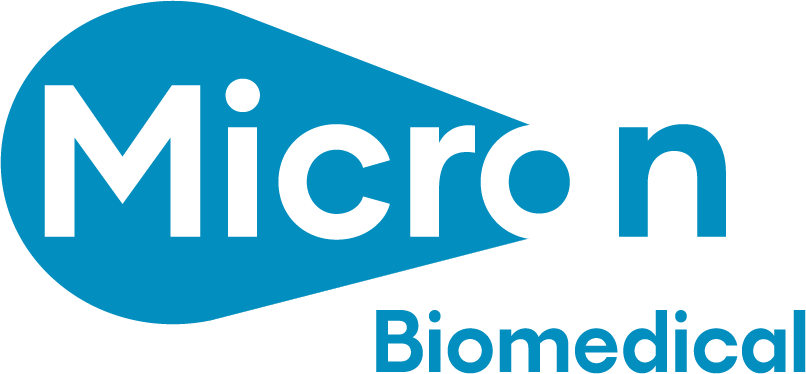Abby HardyNovember 3, 2020
Closely-held Micron Biomedical is developing a dissolvable microneedle-based technology that could enable self-administration of vaccines and therapeutics.
“While microneedle technology is not new, our company represents the evolution of the technology over many years,” Steven Damon, CEO, says in an interview with BioTuesdays.com. “We’re developing an innovative technology that can be used by a variety of healthcare professionals, but ultimately, we see it as way to enable self-medication.”
Mr. Damon explains that microneedle technology has evolved from hollow microneedles through which an active pharmaceutical ingredient (API) is delivered, to API-coated microneedles. He says the limitations of these approaches include lower drug loads, the need for special applicators and the generation of sharps waste.
Micron’s microneedle technology is based on the work that its co-founder and CSO, Mark Prausnitz, Ph.D., conducted at the Georgia Institute of Technology. “He is one of the leaders, if not the leader in microneedle development,” Mr. Damon contends, adding that Micron licensed the technology from Georgia Tech in April 2018.
The technology enables the manufacture API-based microneedles, which are placed on a ‘peel-and-stick’ patch that is applied to and pressed into the skin. An audible and tactile ‘click’ notifies the user of a successful application and, after a few minutes, the patch can be removed and discarded. The application is pain-free and there is no sharps disposal required.

Simple stick, click and remove for pain free administration in minutes
The microneedles dissolve in the skin to rapidly deliver the API, which can be released in a matter of minutes or hours, or over a period of days or weeks, depending on the formulation. The technology can deliver up to 10 mg of API and can be applied to small molecules, nucleic acids, peptides, proteins and therapeutic viruses. In addition, the microneedles are thermostable, which eliminates the need for refrigeration.

Micron’s technology has broad applicability
Mr. Damon says that the pandemic presents new obstacles for patients who would normally go the doctor’s office or to a hospital for an injection. “There is a growing need to change how and where vaccines and therapeutics are administered. We’ve developed a safe, simple, easy-to-apply technology that can be mailed to patients for self-administration at home – or to other healthcare professionals, such as pharmacists for example – to limit patients’ exposure to public medical settings.”
He points out that since the pandemic began, there has been a significant decrease in vaccination rates among individuals of all ages and specifically among children, as parents are weighing the risks and benefits of going to a doctor’s office during a pandemic to vaccinate their children.
“The concept of self-medication isn’t going away, even after the pandemic ends: we’ve learned to adapt to telemedicine, and the self-administration of therapeutics and vaccines isn’t far behind,” Mr. Damon contends.
Micron has completed a Phase 1 clinical trial of a seasonal influenza vaccine based on its microneedle technology, the results of which were published in the peer-reviewed journal, The Lancet. The study demonstrated that, following a vaccination using Micron’s technology, the immune response was as strong, or stronger, than vaccination by intramuscular injection.
In addition, while the safety profile for Micron’s technology and intramuscular vaccination were similar, a survey showed a strong preference for Micron’s technology over conventional vaccination methods.
The company also has completed several studies on the tolerability, usability and acceptability of its technology. A study published in the peer-reviewed journal, Biomaterials, demonstrated that the technology did not cause pain or swelling, and resulted only in redness at the application site, which resolved. Micron’s technology was efficiently applied by both the investigators and the subjects themselves. Again, the microneedle technology was overwhelmingly preferred over conventional needle and syringe injection.
Having attracted foundations, government agencies and pharmaceutical companies as partners, Micron has three Phase 1 and three Phase 2 clinical trials planned through 2022.
The company’s measles-rubella vaccine candidate – which recently received a $2.6-million second tranche of funding from the Bill & Melinda Gates Foundation and is funded through Phase 2 by the Gates Foundation and UNICEF – is set to enter the clinic in the first quarter of 2021, followed by Phase 2 trials in 2022. The company also plans to start a Phase 1 trial of its rotavirus vaccine, which is funded by the Centers for Disease Control, in early 2021.
In addition, Micron is planning to launch a Phase 1 trial later this year to assess a biopharmaceutical whose development is fully funded by an unnamed pharmaceutical company. The company hopes to advance this candidate to a Phase 2 trial in 2021, along with another undisclosed biopharmaceutical, which is pending a funding decision from a different confidential partner.
Micron also has been conducting preclinical studies of two proprietary, preclinical-stage therapeutics and is currently conducting a Series A financing to support these candidates’ development and GMP manufacturing scale-up.
“We’ve built the company with more than $35-million in non-dilutive funding through foundations, agencies and strategic partnerships,” Mr. Damon says. “We are ready to enter the next stage in the company’s development by advancing our partnered programs to mid-stage clinical trials and developing our proprietary candidates.”
Mr. Damon adds that Micron aims to change the perception of injectables and provide individuals with a new option. “We hope the technology will benefit underserved populations, including lower-income groups and individuals who have difficulty accessing health care. Self-administered vaccines and therapeutics are in our future.”
View the original article here: https://biotuesdays.com/2020/11/03/micron-developing-microneedle-technology-for-self-administration-of-vaccines-and-therapeutics/
